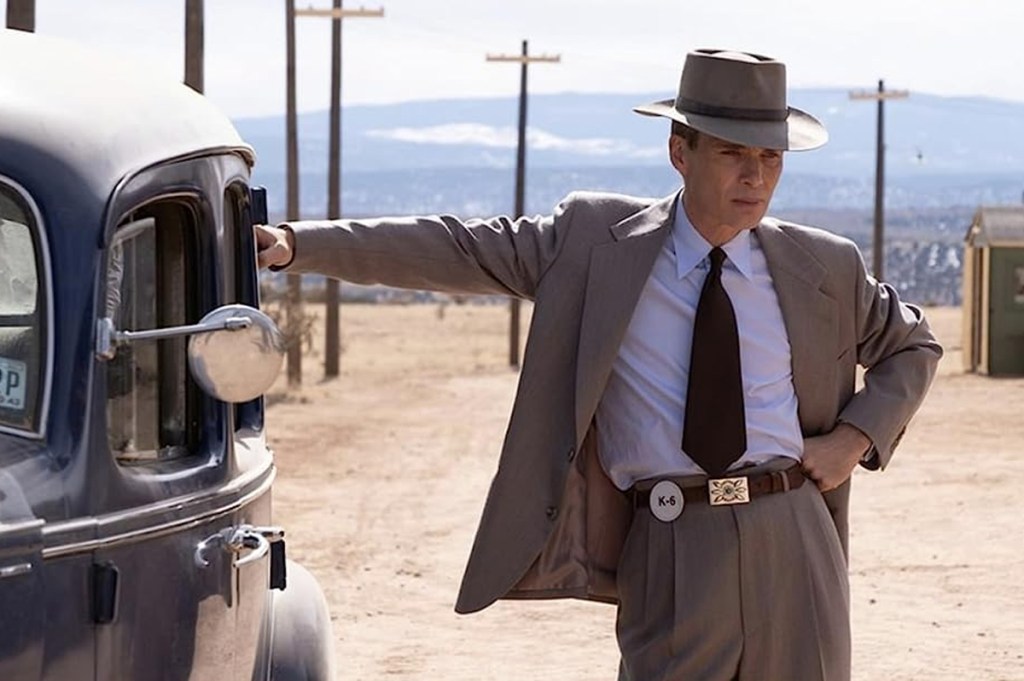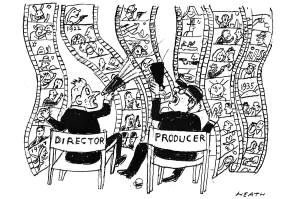This weekend, two films are released simultaneously that could not be more different. In the pink corner is Greta Gerwig’s Barbie, a 114-minute long exercise in postmodern irony and camp revolving around the exploits of the much-beloved Mattel doll, given life and dragged into the real world. From the first, 2001-aping trailer onwards, its mission has been clear: this is contemporary Hollywood at its most glitzy, mixing well-known intellectual property with a starry cast (led by Margot Robbie, who is overdue a hit) and a healthy dose of humor. And in the black corner lies Christopher Nolan’s Oppenheimer, which seems to be another exercise in time-jumping profundity from the most pensive director in cinema, complete with an R-rating (unusually for Nolan, largely for sex and nudity), a three-hour runtime and the biggest bang of them all at the end.
On paper, the films should and will attract vastly different audiences. Barbie is expected to open to a considerably higher gross, thanks to its more commercial length, PG-13 rating and general air of playfulness. Oppenheimer is unlikely to bring in the about $400 million or so at the box office that it needs, yet after the enormous success of The Dark Knight, Inception, Interstellar and Dunkirk, nobody is telling Christopher Nolan what to do. His confused and confusing time-twisting thriller Tenet — released, at his insistence, in the middle of the pandemic, and a relative flop as a result — was proof of that.
The last example of counter-programming this blatant also coincidentally involved Nolan. In 2008, The Dark Knight was released on the same day as the film of the Abba musical Mamma Mia!, meaning that if you wanted to lighten your grim and brooding Nietzschean conflict with Meryl Streep singing Seventies pop hits, your weekend was made. But this time round, there is more at stake. Barbie is expected to be a big hit, with forecasts of an opening weekend gross of $90 million; Oppenheimer will be lucky to make half that. Both films have had their publicity campaigns curtailed by the SAG strike, so their release in a few days now seems almost anti-climatic. Positive word of mouth on both pictures suggests that they will open to excellent reviews, and when the atomic dust cloud settles, we shall see what their relative success or failure suggests about the state of theatergoing today.
Yet strange and unexpected things have happened ever since it was announced that the two films would open on the same day. It has been widely rumored that Warner Bros, which releases Barbie, chose the date out of spite after Nolan, one of its most beloved in-house directors, left the company over an argument about its decision to put its theatrical releases out on streaming services at the same time as their release in cinemas, a catastrophic decision that saw many of their films fail horrendously. (Does anyone remember, or care, about The Matrix Resurrections?)
However, the proximity of two such high-profile films has not only seen them christened with a portmanteau name — Barbenheimer or Oppenbarbie, depending on taste — but also has led to fans announcing that they will do “the double” on their first weekend. Their number includes none other than Tom Cruise, who has announced that he will go and see Oppenheimer on Friday and Barbie on Saturday; spending five hours in the cinema will be a pleasing break from his risking life and limb filming Mission Impossible: Dead Reckoning — Part Two.
Gerwig and Nolan have both been tactful and polite about the others’ film. She said “it’s all love — double up, double up twice… I think you’ve got to take all of the journeys,” whereas he commented that “I think for those of us who care about movies, we’ve been really waiting to have a crowded marketplace again, and now it’s here and that’s terrific.” While it’s easy to imagine Gerwig doing a competent job of Oppenheimer, the idea of the professorial Nolan directing Barbie is inconceivable. Yet both filmmakers have surprising similarities. He has received criticism for the relatively poor treatment of women in his films — they usually end up dying, and barely appeared at all in Dunkirk, perhaps inevitably — and few who saw Little Women or Frances Ha came out extolling the male performances, or the writing and direction of them. Both directors are commercially successfully and critically acclaimed auteurs who enjoy a degree of freedom that their peers do not — hence their films being released cinematically rather than on streaming services — and both have ensured that their pictures have been the most talked-about of the year.
There is a meme floating around social media, based on the cover of Pink Floyd’s Wish You Were Here, which shows a pink-clad Barbie shaking hands with a flaming Oppenheimer. It’s a nice idea, but it hints at a deeper truth, too. With tens of thousands of advance tickets sold for cinemagoers wanting to see both films in a row, the two pictures have supported one another, and the Barbenheimer discourse has raised hype to a level that’s been rare for most contemporary releases.
If they both end up being critical and commercial hits, that will not only benefit an increasingly beleaguered industry, but will also prove that counter-programming can be a positive force, rather than an exercise in competition. And as for me? My Oppenheimer ticket is already booked for 4 p.m. this Friday; Barbie can wait. It’s what she would have wanted, after all.















